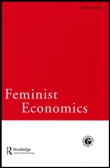
FEMINIST ECONOMICS
Scope & Guideline
Exploring the Nexus of Gender and Economics
Introduction
Aims and Scopes
- Gendered Economic Analysis:
The journal focuses on the economic realities of women and marginalized groups, exploring how gender impacts economic outcomes and decision-making processes. - Intersectionality:
Research published in Feminist Economics emphasizes the importance of intersectionality, analyzing how various social identities (such as race, class, and sexuality) intersect with gender in shaping economic experiences. - Social Reproduction:
The journal highlights the role of unpaid labor and social reproduction in the economy, examining how these elements affect women's economic status and societal roles. - Policy Implications:
Feminist Economics seeks to inform policy discussions, promoting gender-responsive policies that address economic inequalities and improve the welfare of women and marginalized communities. - Historical Contextualization:
The journal often includes historical analyses, situating current economic issues within broader historical frameworks to understand the evolution of gender roles and economic strategies.
Trending and Emerging
- Impact of COVID-19 on Gender:
A significant trend is the exploration of how the COVID-19 pandemic has disproportionately affected women, highlighting issues such as increased unpaid labor, job losses, and mental health challenges. - Digital Economy and Gender:
Research is increasingly focusing on the implications of the digital economy for gender equality, examining how technology impacts women's participation in the workforce and economic opportunities. - Environmental Justice and Feminism:
Emerging themes include the intersection of feminist economics with environmental issues, particularly how gendered perspectives can inform sustainable development and address ecological crises. - Global Supply Chains and Gender:
There is a growing interest in analyzing how global supply chains affect women's labor rights and conditions, emphasizing the need for fair labor practices and policies. - Mental Health and Economic Well-Being:
The relationship between mental health and economic outcomes for women is gaining attention, with research exploring how economic stressors disproportionately impact women's mental health.
Declining or Waning
- Traditional Labor Market Analysis:
There has been a noticeable decrease in research centered solely on traditional labor market dynamics without a gendered lens. The journal is shifting towards more nuanced discussions that incorporate social and cultural factors influencing labor. - Narrow Gender Wage Gap Studies:
Research that focuses only on the quantitative aspects of the gender wage gap without exploring underlying structural and societal issues is becoming less frequent, as the field increasingly prioritizes comprehensive analyses. - Economic Growth Models:
Studies that apply conventional economic growth models without integrating feminist critiques or considerations of gender inequality are appearing less often, as feminist perspectives gain traction in economic discourse. - Individualistic Approaches to Empowerment:
There is a decline in papers that advocate for individualistic empowerment strategies without addressing systemic barriers. The journal is moving towards collective and structural solutions to gender inequality. - Gender and Development within a Single Framework:
Research that examines gender and development in isolation from other intersecting factors is decreasing, as the journal promotes a more integrated approach that considers multiple dimensions of inequality.
Similar Journals

B E Journal of Economic Analysis & Policy
Advancing Economic Insights for a Global PerspectiveB E Journal of Economic Analysis & Policy, published by Walter de Gruyter GmbH in Germany, stands as a pivotal resource in the field of economics and econometrics since its establishment in 2001. Boasting an ISSN of 2194-6108 and an E-ISSN of 1935-1682, this journal is committed to advancing the understanding of economic policies and their analysis through rigorous, peer-reviewed research. With an impressive categorization that includes a Q2 ranking in the Economics, Econometrics and Finance (miscellaneous) category and a Q3 ranking in other economics niches as of 2023, it emphasizes the importance of empirical research and robust theoretical frameworks. The journal is indexed in Scopus, reaffirming its credibility, with ranks in the 49th and 32nd percentiles for its respective categories. Researchers, professionals, and students alike will find valuable insights and innovative perspectives within its pages, as it continues to shape discussions around economic policy in an ever-evolving global landscape.
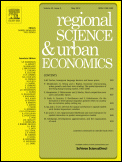
REGIONAL SCIENCE AND URBAN ECONOMICS
Navigating the future of cities through rigorous analysis.Regional Science and Urban Economics, published by Elsevier, is a premier academic journal dedicated to advancing the understanding of spatial dynamics and urbanization. With an ISSN of 0166-0462 and E-ISSN 1879-2308, this journal has established itself as a vital resource for researchers and practitioners in economics and urban studies, boasting a remarkable impact factor and ranking in the Q1 category for both fields. Since its inception in 1975, the journal has provided a platform for high-quality research that examines both theoretical and empirical aspects of regional science and urban economics. With a Scopus rank of 47th in Urban Studies and 157th in Economics, it ensures that the latest findings reach a wide audience. Researchers interested in exploring spatial economics and urbanization trends will find this journal indispensable for staying at the forefront of their fields, facilitating collaboration and innovation in addressing contemporary urban challenges.
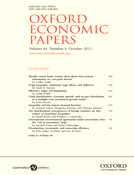
OXFORD ECONOMIC PAPERS-NEW SERIES
Illuminating trends and policies with scholarly precision.OXFORD ECONOMIC PAPERS-NEW SERIES is a prestigious academic journal published by Oxford University Press, dedicated to advancing the field of economics and econometrics. With an ISSN of 0030-7653 and an E-ISSN of 1464-3812, this journal has a rich history since its inception in 1938, and continues to play a vital role in disseminating impactful research through its convergence of years spanning from 1938 to 2024. Recognized as a Q2 journal in the 2023 category of Economics and Econometrics, it ranks #396 among 716 in its field according to Scopus, reflecting a commendable position within the academic community, particularly in global economic discussions. While the journal currently does not offer open access options, it remains committed to providing a platform for rigorous research and critical discourse. Researchers, professionals, and students will find the journal's articles to be essential reading, offering insights that are pivotal for understanding economic trends, policies, and methodologies. Its focus on high-quality scholarship ensures that contributions are both theoretically robust and practically relevant, making it a significant resource in the ever-evolving landscape of economic research.
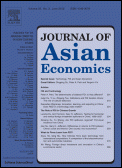
Journal of Asian Economics
Illuminating Economic Trends Across AsiaThe Journal of Asian Economics, published by Elsevier, serves as a pivotal platform for scholars and practitioners engaged in the comprehensive study of economic issues within Asia. With an ISSN of 1049-0078 and an E-ISSN of 1873-7927, this esteemed journal encompasses a wide array of topics in its scope, ranging from macroeconomic policy analysis to the intricacies of financial markets in the Asian context. Ranking in the Q2 category for both Economics and Econometrics and Finance, according to the 2023 metrics, it is positioned among the top-tier journals, currently holding a significant place at the 73rd percentile in Finance and 72nd percentile in Economics. This journal not only caters to academic researchers looking to publish their findings but also serves as an essential resource for professionals and students seeking to deepen their understanding of the dynamic economic landscape in Asia. By bridging empirical research and practical insights, the Journal of Asian Economics plays a crucial role in advancing knowledge and encouraging discourse in the field.
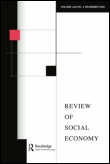
REVIEW OF SOCIAL ECONOMY
Connecting Scholars to the Heart of Economic ResearchREVIEW OF SOCIAL ECONOMY, published by ROUTLEDGE JOURNALS, TAYLOR & FRANCIS LTD, is a distinguished academic journal that has been at the forefront of social economy research since its inception in 1942. With an ISSN of 0034-6764 and an E-ISSN of 1470-1162, this journal plays a pivotal role in disseminating innovative research and critical analysis in the fields of economics and econometrics. Recognized for its contributions, it holds a reputable Q2 ranking in the 2023 Category Quartiles and ranks #346 out of 716 journals in its field according to Scopus. The journal is dedicated to engaging scholars, practitioners, and students with various dimensions of social economy, promoting interdisciplinary dialogue and showcasing impactful research. Although it currently does not offer open access options, the REVIEW OF SOCIAL ECONOMY remains an invaluable resource for those seeking to further their understanding of the complexities of social and economic interactions, underpinning its importance in both academic and professional contexts.
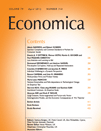
ECONOMICA
Shaping the Future of Economic UnderstandingEconomica is a prestigious academic journal published by Wiley, with a rich history dating back to 1937. Based in the United Kingdom, this journal has established itself as a key resource in the field of Economics and Econometrics, classified in the top quartile (Q1) of its category for 2023. With an ISSN of 0013-0427 and an E-ISSN of 1468-0335, Economica covers a wide array of topics that contribute to the understanding of economic theory and practice, making it essential reading for researchers, professionals, and students alike. Despite being a subscription-based journal, its rigorous editorial process ensures that only the highest quality research is published, further bolstering its impact and influence in the academic community. The journal plays a vital role in advancing economic scholarship by featuring original research articles, critical reviews, and innovative methodologies, promoting discourse among scholars and practitioners.

Cuestiones de Sociologia
Fostering Open Access to Sociological KnowledgeCuestiones de Sociologia is a distinguished academic journal dedicated to the multifaceted field of sociology, published by the Universidad Nacional de La Plata, Facultad de Humanidades y Ciencias de la Educación. Since its inception, this journal has aimed to foster a deeper understanding of social phenomena through rigorous research, theoretical discourses, and empirical studies. It has been designated as an Open Access journal since 2012, ensuring that valuable research is readily accessible to scholars, professionals, and students worldwide, thus enhancing its impact and reach within the academic community. Although current details such as H-index and specific scope have not been provided, the journal prominently contributes to the discourse around critical sociological issues, making it an invaluable resource for those engaged in the study of human behavior, social structures, and cultural dynamics. By promoting high-quality research, Cuestiones de Sociologia solidifies its position as a crucial platform for sociological inquiry in Latin America and beyond.

Review of Economics of the Household
Bridging Theory and Practice in Household StudiesThe Review of Economics of the Household, published by Springer, is a leading interdisciplinary journal that shapes the landscape of household economics with rigorous research and innovative methodologies. With an impact factor reflecting its high citation rate and significance in the field, this journal is categorized in the prestigious Q1 quartiles for both Economics and Econometrics and Social Sciences (miscellaneous) for 2023. It ranks impressively at #17/604 in Social Sciences and #67/716 in Economics, highlighting its relevance and authority within academic and professional circles. Covering a broad spectrum of topics, it seeks to provide insightful analyses regarding household decision-making, economic behaviors, and socio-economic impacts. The journal is integral for researchers, professionals, and students aiming to deepen their understanding of household dynamics in an ever-evolving economic landscape. Located in the Netherlands, and accessible through institutional subscriptions, the journal ensures that vital research is shared and disseminated widely, contributing significantly to the advancement of the field.
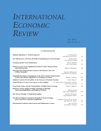
INTERNATIONAL ECONOMIC REVIEW
Exploring the forefront of economic research since 1979.INTERNATIONAL ECONOMIC REVIEW is a prestigious journal dedicated to advancing knowledge in the fields of economics and econometrics. Published by Wiley in the United Kingdom, this journal boasts an impressive Q1 ranking in the 2023 category of Economics and Econometrics, reflecting its significant impact in the academic community. With a continued publication since its inception in 1979, it offers a platform for rigorous scholarly articles that address contemporary issues, theoretical developments, and empirical findings in economics. Although it does not currently offer open access options, the journal maintains broad accessibility through institutional subscriptions. Researchers, professionals, and students are encouraged to contribute to and engage with this leading publication to foster knowledge exchange and stimulate scholarly dialogue in economic research. With its commitment to high-quality scholarship, the INTERNATIONAL ECONOMIC REVIEW remains a vital resource for developing insights that inform both policy and practice.

Ekonomista
Fostering innovative insights in the world of economics.Ekonomista is a distinguished open-access journal dedicated to the field of economics, published by the Polskie Towarzystwo Ekonomiczne. Since its transition to open access in 2022, the journal has enhanced its mission to disseminate high-quality research that serves the academic community and informs policymakers. With an ISSN of 0013-3205 and an E-ISSN of 2299-6184, Ekonomista aims to foster rigorous discussions and innovative perspectives on current economic issues. Although it has experienced lapses in coverage through Scopus, its commitment to advancing knowledge in Economics, particularly in the realms of econometrics and finance, remains steadfast. The journal is indexed within the lower echelons of Scopus rankings, providing an opportunity for new voices in the discipline to emerge and contribute to the ongoing discourse. Positioned at ul. Nowy Swiat 49 in Warszawa, Poland, Ekonomista not only connects researchers and professionals but also serves as an educational resource for students aiming to deepen their understanding of economic theories and practices.